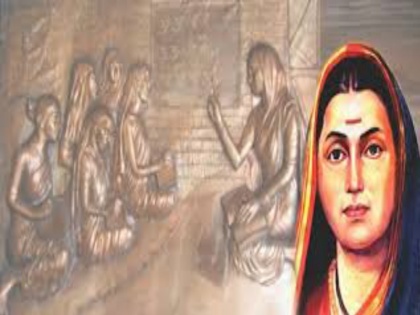Savitri Bai Phule Jayanti 2024: Known Facts of Legendary Women
By Lokmat English Desk | Published: January 3, 2024 10:14 AM2024-01-03T10:14:17+5:302024-01-03T10:16:50+5:30
On this day (3rd January 1831), we honor the birth anniversary of Savitribai Phule, a trailblazer in the realm ...

Savitri Bai Phule Jayanti 2024: Known Facts of Legendary Women
On this day (3rd January 1831), we honor the birth anniversary of Savitribai Phule, a trailblazer in the realm of female education in India. Her legacy goes beyond personal challenges, forming a cornerstone of a broader movement for social upliftment and education. Today's celebration serves as a tribute to her enduring impact on shaping the narrative of education and societal transformation in India.
Born into a society where educational opportunities were restricted; Savitribai's journey took a transformative turn through her marriage to Jyotirao Phule. At the time of their union, Savitribai was illiterate, while Jyotirao had attained education up to the third grade. During this era, education was often a privilege reserved for higher castes, with Dalits and women denied access. This disparity fueled Savitribai's determination to challenge societal norms and advocate for educational rights.
View this post on Instagram
Savitribai Phule became a beacon of change by absorbing knowledge from her husband, the renowned Dalit thinker and social reformer Mahatma Jyotirao Phule. In the 19th century, she fearlessly addressed issues such as women's rights, illiteracy, untouchability, Sati practices, child marriage, and widow remarriage. Her tireless efforts focused on dismantling superstitions and challenging regressive traditions that hindered societal progress. Collaborating with her husband, Savitribai Phule embarked on a groundbreaking initiative by establishing 18 schools dedicated to girls. The inaugural girls' school in Pune, Maharashtra, emerged in 1848, paving the way for subsequent institutions that contributed significantly to the empowerment of young girls. A notable milestone in their compassionate efforts occurred on January 28, 1853, when the couple founded a shelter for pregnant rape victims, a crucial endeavor aimed at preventing infanticide. Savitribai Phule's unwavering spirit and commitment to education and social reform persist as a resonant force, highlighting the pivotal role she played in shaping India's educational landscape and challenging entrenched prejudices.
The journey was not without its challenges. When Savitribai Phule ventured to teach girls, she faced vehement opposition in Pune, with people resorting to throwing cow dung and stones at her. Undeterred, she persevered, carrying an extra sari in her bag each day to change after enduring such adversities on her way to school. It's crucial to note that Savitribai opened schools for girls during an era when educating them was frowned upon.
Beyond her contributions to education, Savitribai Phule was also a distinguished poetess, earning the title of the first Marathi poetess. Her multifaceted legacy encompasses not only pioneering educational reform but also a poetic expression that further enriches the cultural tapestry of Maharashtra.
In last 'Mann ki Baat,' episode Prime Minister Narendra Modi paid tribute to Savitribai Phule and her husband Jyotirao Phule, acknowledging their unwavering commitment to education and social reform. Prime Minister Modi lauded their notable contributions, citing their act of opening their doors to the needy during a famine in Maharashtra. He also commended their selfless service during a plague outbreak, even as Savitribai herself succumbed to the disease. The Prime Minister underscored that the Phule couple's lives serve as a timeless source of inspiration, illustrating an extraordinary dedication to humanity that resonates with us all.
Open in app